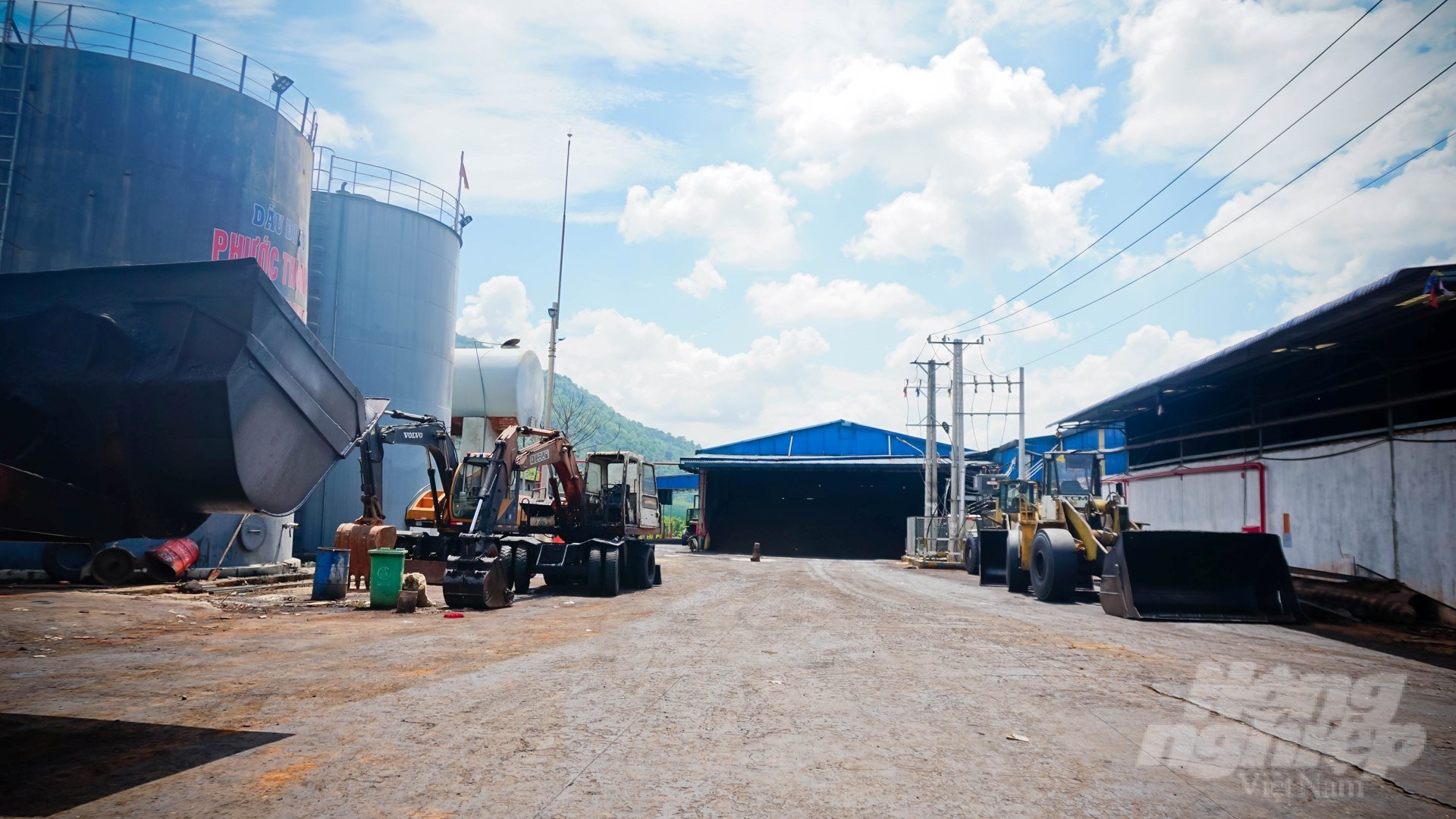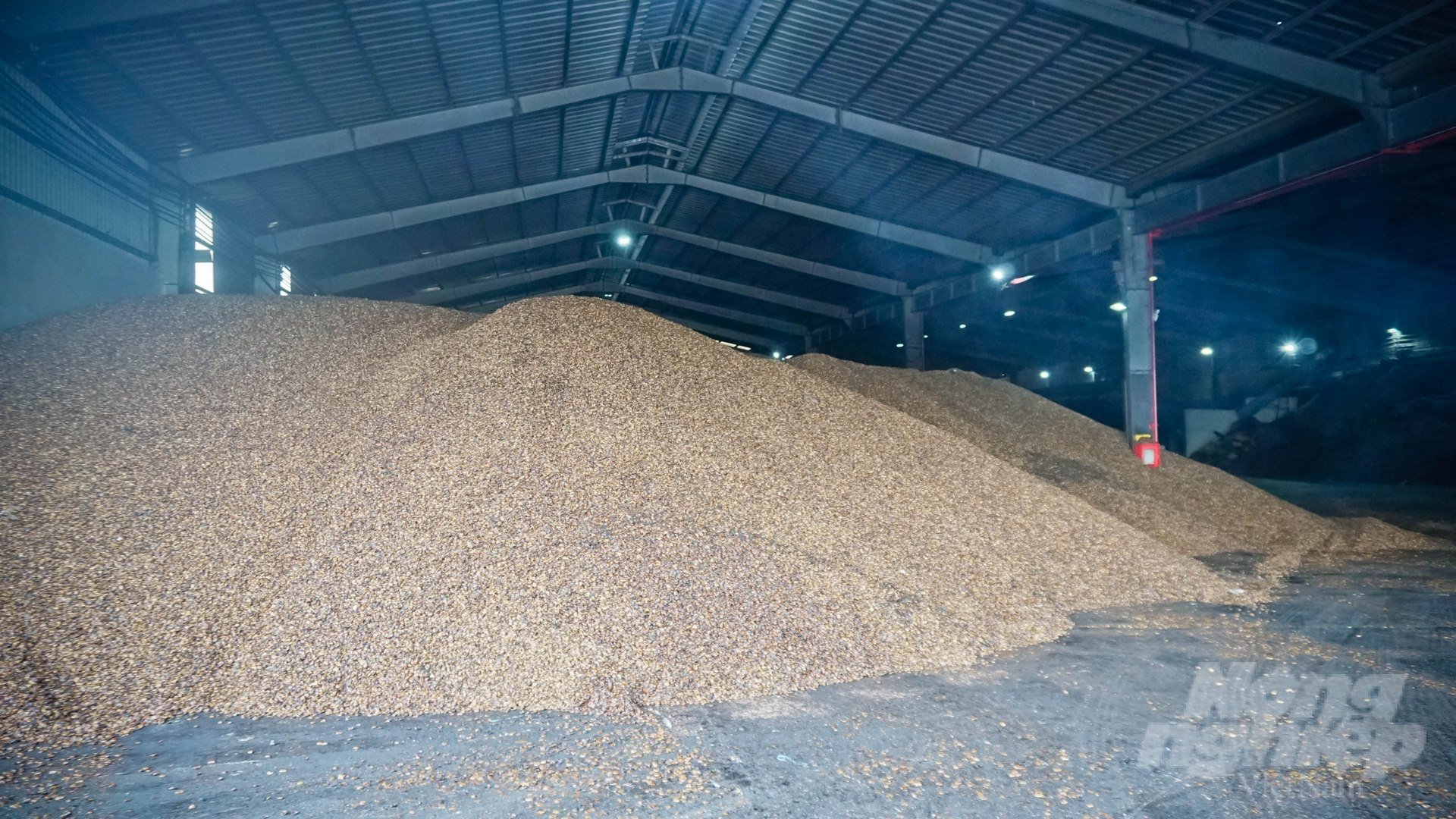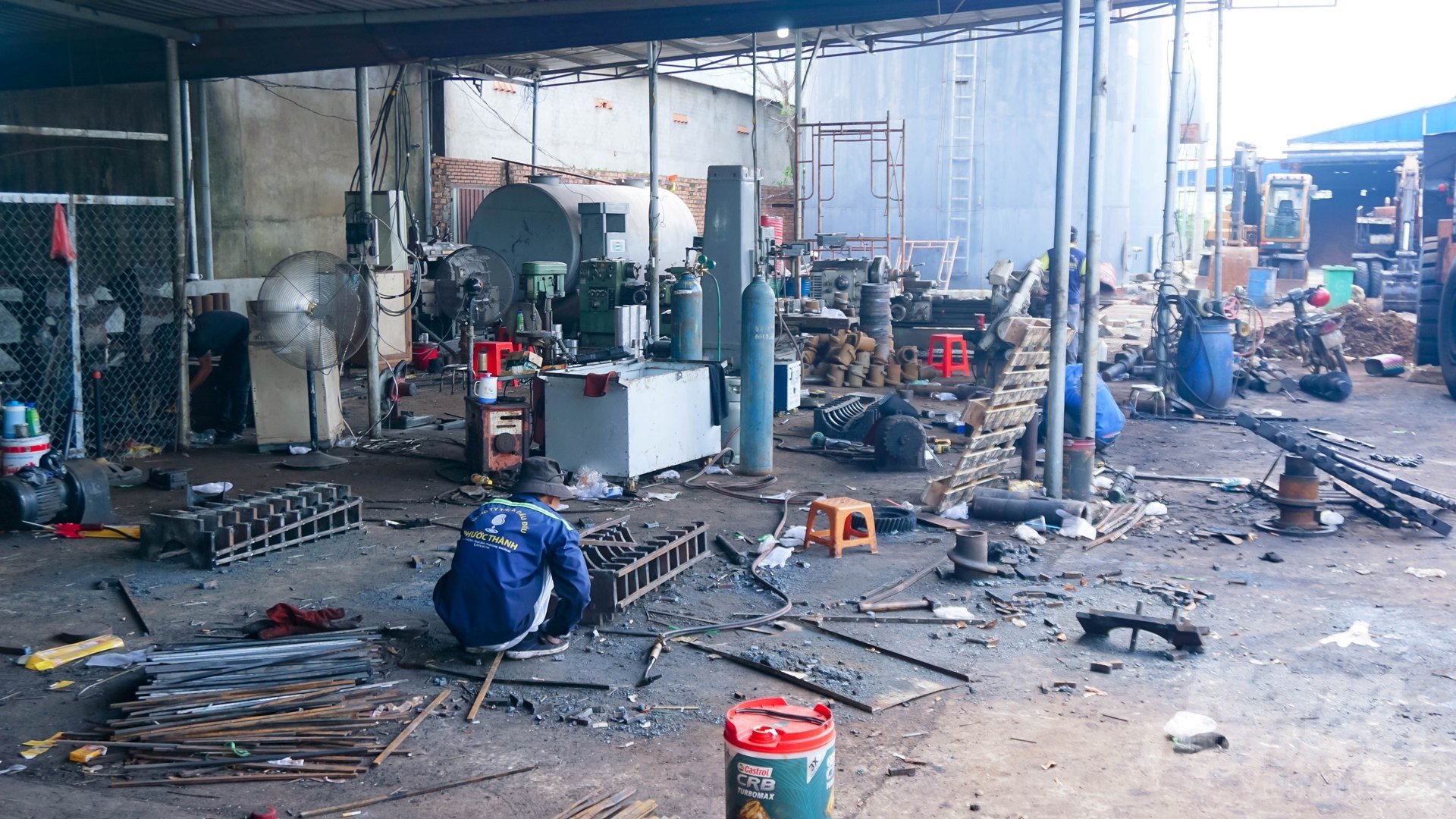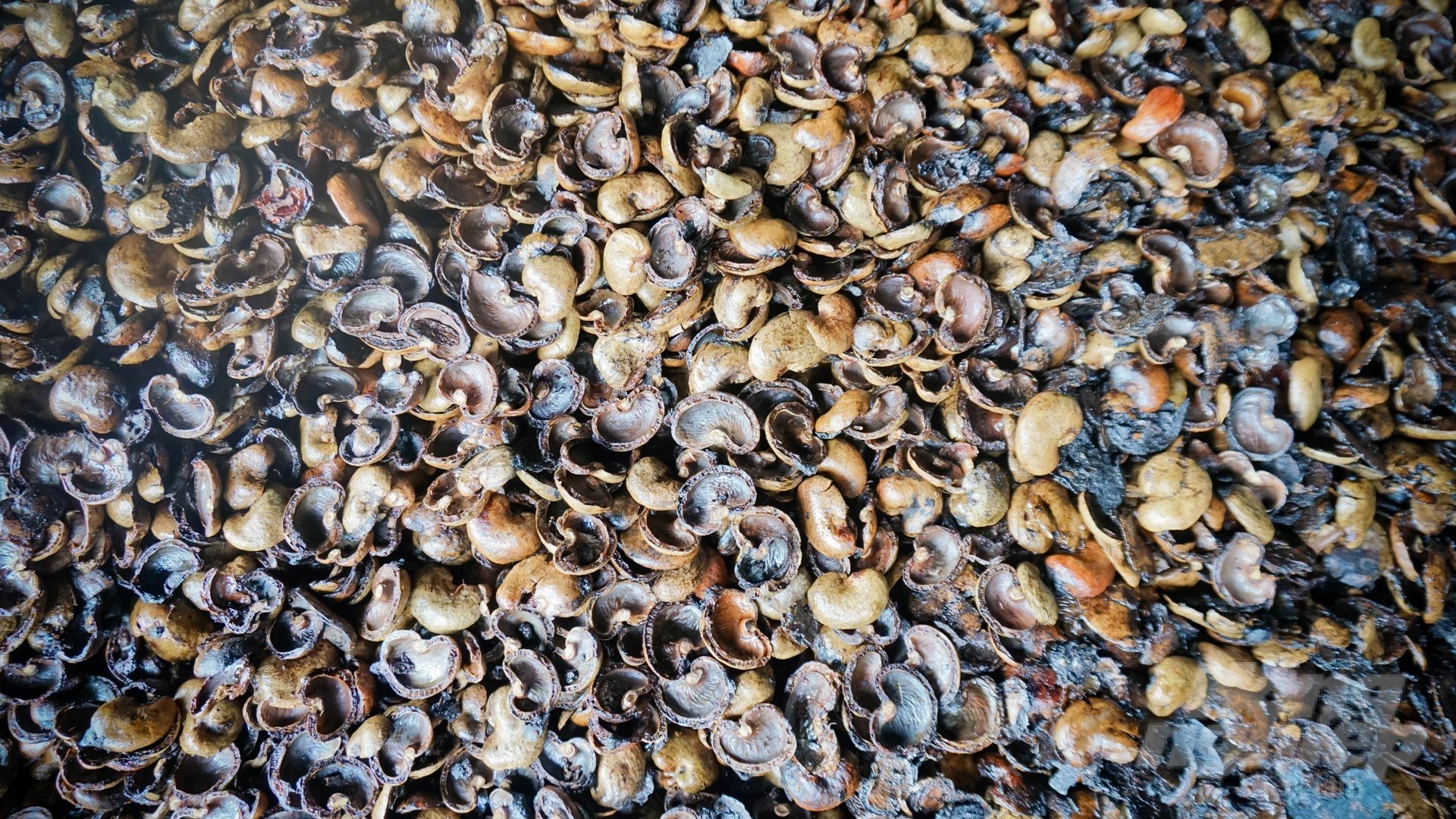June 4, 2025 | 08:33 GMT +7
June 4, 2025 | 08:33 GMT +7
Hotline: 0913.378.918
June 4, 2025 | 08:33 GMT +7
Hotline: 0913.378.918
Cashew shells are considered refuse that previously required a great deal of time and effort to burn, causing environmental pollution. Utilizing mechanical technology, cashew kernel shells are transformed into useful oil for a variety of auxiliary industries, thereby assisting businesses in Binh Phuoc to surmount current obstacles.

Phuoc Thanh Agricultural Products Processing Company Limited is one of the "leading birds" in Binh Phuoc turning cashew shells into oil, selling at high prices. Photo: Le Binh.
The cashew oil press facility of Mr. Bui Huu Phuoc (Phuoc Thanh Agricultural Products Processing Company Limited, Phuoc Binh Ward, Phuoc Long Town) is one of the pioneers in this field. Mr. Phuoc has invested in a system of sophisticated and contemporary equipment lines that are semi-automatically operated.
After ten years in the cashew nut processing industry, Mr. Phuoc discovered that the oil from the cashew nut shell contains a mixture of natural alkyl phenols, which are versatile raw materials with numerous applications. Extensively employed as a surface coating, paint, varnish, polymer production, ship paint, wood treatment, lacquer, fuel, antibacterial extract, etc.
Mr. Phuoc determined through research in the provinces that the operational principle of the coconut coir fiber extracting machine can be modified into a cashew shell press. After tinkering with research, he decided to establish a factory to purchase cashew shells for oil pressing from the business.
According to Mr. Phuoc, extracting cashew oil is a straightforward procedure. The cashew kernel shells are imported, placed in containers by excavators, then transferred to the press, the cashew oil flows into the front tank, and the remainder flows to the rear conveyor and warehouse. For each ton of cashew nut shells, 230 kilograms of oil can be extracted, while the remainder are used as a substitute for coal and charcoal.

Cashew shell is an extremely abundant and cheap material, but it has not been used much. This is an "open gold mine" with a lot of potential. Photo: Le Binh.
With approximately 200 enterprises and 1,400 cashew processing facilities, Binh Phuoc is a cashew center and the nation's cashew processing complex. When cashew kernel refining is thriving, a great deal of cashew shells are discarded. The establishment of cashew oil production companies has assisted in resolving the contamination issue caused by cashew shells and enhanced the local cashew production and processing industry.
Mr. Bui Van Tan, the owner of the Hoang Long cashew kernel production facility (Thanh Binh town, Bu Dop district), stated that the facility produces approximately 30 tons of raw cashews and 20 to 21 tons of cashew shells per day, causing pollution in nearby residential areas. However, when cashew oil production companies were established, the establishment not only no longer had to worry about the quantity of cashew nut shells discharged, but also saw a substantial increase in revenue from the sale of cashew nut shells.

"Necessity is the mother of invention", many business owners are making their own machines to turn cashew shells into "pure gold". Photo: Le Binh.
Ms. Nguyen Tam Hanh, Deputy Director of My Hanh Private Enterprise in Long Phuoc Ward (Phuoc Long Town), reported that her company produces 3 tons of cashew kernels per day and emits 9 to 10 tons of shells. Cashew nut shells are frequently used as fuel, but they have a significant impact on the environment, and their disposal as waste is costly in terms of transportation, storage, etc.
According to Mr. Phuoc, Binh Phuoc has over 30 cashew oil pressing facilities, the majority of which are located in the municipality of Phuoc Long. Currently, the cashew oil market is very large and expanding rapidly, with exports to China, Korea, Japan, Europe, and the United States accounting for 80% of output.
With over 40 cashew oil presses, Mr. Phuoc's factory consumes nearly 1,500 tons of cashew kernel shells daily, produces 230 to 250 kg of oil at a price of 10,000 VND per kilogram, and earns billions of dongs annually.
Since the production of cashew oil, cashew kernel shells have become a valuable basic material. This manufacturing industry contributes not only economically but also to the resolution of environmental issues, thereby fostering rapid and sustainable economic development. Implementing circular economy development in the cashew processing industry is an excellent opportunity to boost economic efficiency and enhance the cashew industry's value-added.
According to the Department of Industry and Trade of Binh Phuoc province, cashew oil shell pressing technology has witnessed many phases of development since 2003. In addition, the number of businesses participating in this market is progressively increasing in the area. province and has spread to a large number of communities in the South.
The rapid development of technology to extract oil from cashew nut shells has created a competitive market for cashew nut shell materials within and beyond the province. Even international markets export cashew shells to Vietnam to supply processing plants. Due to the emergence of natural screening, many businesses ceased operations or reduced the scope of their processing, allowing larger enterprises in terms of capital, technological level, and capacity to mobilize raw materials to enter the market.

In addition to processing into cashew oil, the shell can also be used to make fuel, and chipboard. Photo: Le Binh.
In 2021, Binh Phuoc experienced a resurgence with the enterprise's demand to invest in constructing new oil facilities extracted from cashew nut shells, resulting in a gradual increase in the price of shell materials and the selling price of products. Numerous domestic and international investors soon recognized the enormous potential of this market in terms of output scale, product quality, and byproducts of the oil pressing and extraction process. The cashew nut shell byproduct could even be used to produce pellets for fuel, biomass electric energy generation, etc.
The oil extracted from cashew nut husks in the province of Binh Phuoc is attracting foreign investment thanks to its ability to reduce emissions when progressively replacing diesel oil in certain fields. This demand creates a new surge of investment in the province with high competitiveness in terms of technology level, high technical human resources, and particularly the capacity to link planting areas, forming production value chains - a sustainable export industry in the province. In addition to its primary product category, cashew kernels, Binh Phuoc has been devoting special attention to this industry.
Translated by Linh Linh

(VAN) TTC AgriS and IFC signed a strategic partnership to develop a sustainable agricultural value chain, aiming to achieve the Net Zero target by 2035.

(VAN) Seafood by-products are opening a new path, combining green growth and technological innovation to enhance the industry's value.

(VAN) Mr. Nguyen Thanh Cong, Vice Chairman of the Son La Provincial People's Committee, reflects on Son La’s journey from barren hills to fruitful orchards after a decade of hard work.

(VAN) FAO’s Director-General addresses the 5th Baghdad International Water Conference.
/2025/05/26/1716-4-nongnghiep-191706.jpg)
(VAN) Chain linkages, technological innovation, and raw material zoning are three strategic pillars for the coconut industry to strongly develop and elevate its position on the global agricultural map.
![Advanced mariculture – an inevitable trend: [4] Accompanied by scientists](https://t.ex-cdn.com/nongnghiepmoitruong.vn/608w/files/sohk/2025/05/13/1941-pgsts-vo-van-nha-140958_717.jpg)
(VAN) According to Assoc. Prof. Dr. Vo Van Nha, Director of the RIA III, the development of advanced offshore mariculture is no longer an option but an essential path for Vietnam’s fisheries sector.

(VAN) Vietnam is intensifying the development of mollusk farming areas that meet international standards, aiming for sustainable growth and enhancing its export position in the global seafood market.